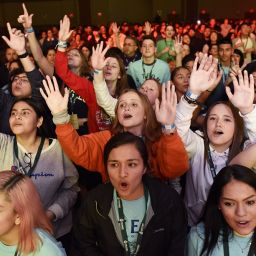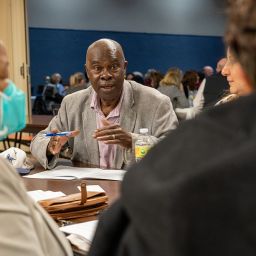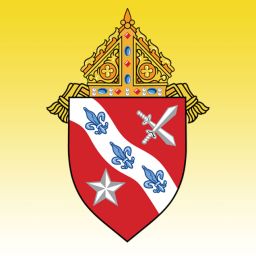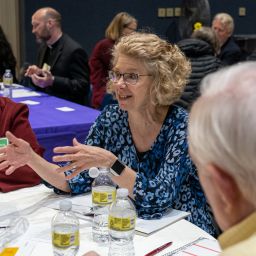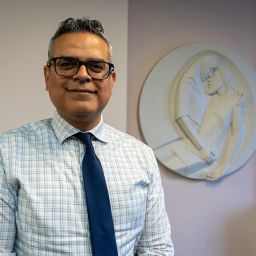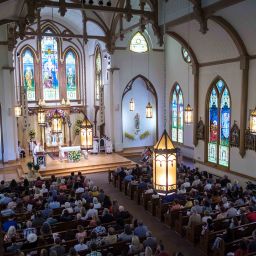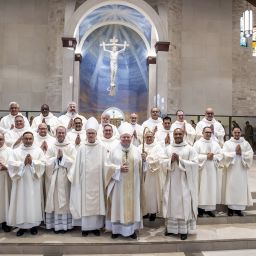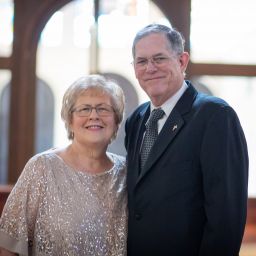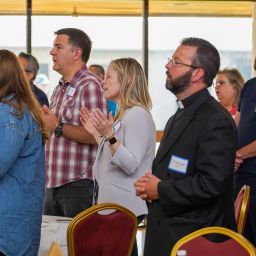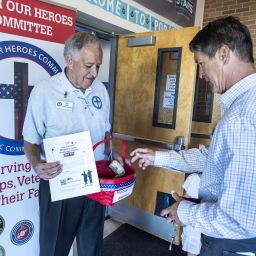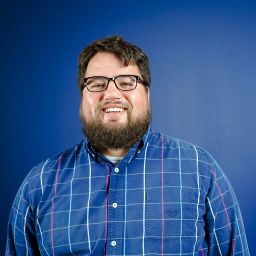By Michael Gresham
The Texas Catholic
Delegates across the diocese gathered for the Diocese of Dallas Synod assembly Dec. 1-4, describing it as a spirit-led journey of listening, dialogue, and discernment. Representing parishes, organizations, and ministries of the diocese, the 284 delegates embraced Bishop Edward J. Burns’ call to journey together, fostering unity while discerning the challenges and needs of today’s Church.
As the synod assembly came to a close, delegates recounted moments of profound prayer, open-hearted conversations, and renewed commitment to their faith communities, underscoring the assembly as a milestone of collaboration and spiritual growth.
Cole Holleman, a parishioner of St. William Catholic Church in Greenville, said involvement in the synod assembly as a delegate enriched his understanding of the diocese and strengthened his faith.
“The synod process has really deepened my understanding of the diocese as a whole,” Holleman said. “Hearing my fellow delegates share their unique perspectives was incredibly enlightening. We’re often in our own little bubbles, but this process helped me realize how many parishes with such different needs there are. I think that will be super helpful for the growth of the Church as a whole.”
Father Elmer Herrera-Guzman, pastor of both Holy Cross and St. Anthony parishes, described the opportunity to be an assembly delegate as being an eye-opening experience.
“There are so many people sharing ideas, and a lot of those ideas, I’ve never heard, nor have I ever deeply considered before,” he said. “Just by others bringing these ideas and concerns up, it has allowed me to actually consider and pray upon them with everyone who was in the room.”
Together in faith
The Diocese of Dallas Synod opened with a Mass on Dec. 12, 2021, the feast of Our Lady of Guadalupe, and its preparatory phase included 30 listening sessions over two years. Sister Mary Anne Zuberbueler, O.P., principal of Mary Immaculate Catholic School in Farmers Branch, served on the synod’s 27-member preparatory commission. She, like many others, participated in those listening sessions, calling them a process of active prayer and discernment. Throughout those sessions and during the assembly, Sister Zuberbueler said she witnessed God’s guiding hand at work through the Holy Spirit.
“We’ve prayed; we’ve discerned; and the Holy Spirit is here, working in this group,” Sister Zuberbueler said. “The Lord promises us that where two or three are gathered in His name, He is there. That has been so evident in these conversations, both in and outside the formal proceedings.”
Having attended those listening sessions and participated in delegate small group discussions prior to the assembly, Daniel Njenga, a parishioner at St. Patrick Catholic Church in Dallas, agreed.
“In those meetings, hearing people present their views and share their hearts, you can feel the Holy Spirit moving,” Njenga said. “The Holy Spirit is calling us to bring back those who have fallen away, to baptize those who are yet to be catechized, and to renew the faith experience for those already in our pews. It’s about making disciples of all nations.”
Lindee Greer, a parishioner at Holy Spirit Catholic Church in Duncanville, said she too felt the Holy Spirit at work throughout the assembly, drawing delegates together and igniting passion for their faith.
“You can hear that passion when people made their comments about the various resolutions and then also the spirit of understanding one another,” Greer said, adding that the delegates were there to make a difference and a positive impact on the diocese. “We had to allow ourselves to be open to how the Holy Spirit speaks through ourselves and others, often in unexpected ways. It really was a beautiful part of the process.”
Answering the call
Throughout the synodal process, Bishop Burns has prioritized hearing the voices of the laity and fostering a spirit of collaboration across the diocese. For delegate Edna Gamiño, a parishioner of St. Philip the Apostle Catholic Church, it also highlighted the essential role of laypeople in living out their baptismal call.
“What I hope moving forward is that the diocese continues to help the average Catholic see themselves as disciples,” Gamiño said. “It’s about recognizing that our faith isn’t confined to the walls of the parish but is something we live authentically every day, wherever we are.”
Gamiño called the synodal process a call to action, calling her to be more deeply engaged with her faith—whether at work or at home.
“It’s reminded me of the role I have as a Catholic to be able to journey with others as the Church is doing with us,” Gamiño said.
One of the most profound aspects for Holleman was the prayerful atmosphere of the synod assembly.
“My favorite thing about this process is how steeped in prayer it has been,” he said. “From starting the day with the Liturgy of the Hours to daily Mass and beginning and ending every session with prayer, you can feel a joy and peace that permeates the whole event. I think that has resulted in some great fruit. ”
A focus on vocations
Discussions on vocations were a vital part of the synod, with particular focus on married, priestly, and religious life. Father Mark Garrett, a delegate who also serves as the diocesan director of vocations, shared his hopes for a continued flourishing of vocations across the diocese.
“Vocation work can’t just be the responsibility of the Office of Vocations. It’s the work of the entire diocese—parishes, families, and communities,” Father Garrett said, noting that delegates during the assembly shared inspiring stories of how they discovered their vocations, whether to marriage, the priesthood, or religious life. “It’s clear that those moments of encouragement came from their communities. It’s a reminder that we all share in the responsibility to foster and support vocations.”
Father Garrett said the synod assembly also provided an opportunity for diocesan leaders and delegates to reflect on stories they might otherwise never have encountered.
“I think if anyone’s going to be able to respond to the needs of the parishes, to the needs of the diocese moving forward, it’s going to happen now because we know those stories, and the synod is the vehicle for that to happen,” Father Garrett said.
As a seminarian at Holy Trinity Seminary in Irving, delegate Daniel Sanchez, a young adult himself, said he was excited about the focus on youth, young adults, and their unique contributions to the Church’s mission.
“Youth have an infectious joy and a special way of ministering the Word of God,” Sanchez said. “I look to Blessed Carlo Acutis and St. José Sánchez del Río, and I know that we’re called to support and evangelize to our youth so that they can then evangelize to not only their peers, but also to the adults who are in need of that infectious joy.”
As the synod moves into its implementation phase, Sanchez emphasized the vital role of lay involvement.
“The laity must be involved. We recognize the need for the lay faithful to really bring the Gospel to others,” Sanchez said. “Their witness can draw others to Jesus Christ.”
As a lay participant, Holleman said he also sees the synod as a critical moment to mobilize the laity in the diocese.
“I hope that the diocese uses the lay people, continues to use us, and that we become a Church of action,” he said. “I hope that the diocese sees all of these people who are willing, and that they are here, ready to serve, and ready to go out into the streets and make these changes.”
Njenga agreed that the laity must continue to play a vital role in fulfilling the Church’s mission.
“The laypeople are the ones who make up our diocese,” Njenga said. “Laypeople must take more responsibility. Laypeople have to be at the forefront of making disciples in the name of Jesus. This isn’t just a task for our priests; it’s our mission to bring Jesus to our communities, to our neighbors, to our children, and to all the people around us.”
Greer added that it always will be important to engage the laity in the life of the Church, especially as resources remain limited.
“It’s critical that we recognize their challenges in an increasingly busy world, and that we call to them, highlighting the importance of their role in the Church and in their communities where they live and serve,” she said, adding that she hoped the diocese would work to ensure opportunities for ongoing faith formation—lifelong and multi-generational—so that adults are better equipped to fulfill their role as primary catechists for their children. “It’s not just a one and done; it has to be an ongoing approach.”
Embracing the vision
Reflecting on the overall experience, Holleman said he was optimistic about the future of the diocese.
“This whole process has helped me, and I believe many others, embrace our apostolic mission,” he said. “It’s been encouraging to see other people who are bought in and who are sold out for the Gospel. Whether you’re young or old, from a large parish or a small one, we’re all unified in our mission to transform this diocese as we know it. That spirit of encouragement will change the face of the Church.”
Father Herrera-Guzman said the synod continues to be a journey of prayer, dialogue, and action as the people of the diocese work toward a renewed vision for their faith community.
“For us to truly embrace the apostolic mission, we have to be in one accord,” Father Herrera-Guzman said. “Our hearts need to beat in one rhythm, and that rhythm is what the synod is trying to get us back to — that way, we’re all beating in one rhythm, one symphony for God.”
Sister Zuberbueler believes the lasting impact of the synod will be to provide renewed momentum for the faithful of the Diocese of Dallas.
“Every day, people in our diocese get up willing and ready to do God’s work, to proclaim the mission,” she said. “I think that the synod is going to create a great energy and flow for people to once again embrace their own personal call to holiness but also to working in the Church and working in the broader community.”
In calling the synod, Sister Zuberbueler believes Bishop Burns sought to re-ignite that passion in the faithful in the Diocese of Dallas, urging them to live out their Catholic faith as disciples of Christ.
“Bishop Burns has repeatedly reminded us that it’s not just about Catholics in the Diocese of Dallas but about all those he shepherds,” she explained. “Together, that apostolic mission is both individual and collective, and we’re ready to go.”
Keep up to date on the Diocese of Dallas Synod by visiting synod.cathdal.org.
Cutline for featured image: Auxiliary Bishop Greg Kelly discusses the prioritization of resolutions during the Diocese of Dallas Synod Assembly on Dec. 3 at the Dallas-Fort Worth Marriott hotel in Irving. From Dec. 1-4, 284 delegates gathered to offer a consultative vote on 376 resolutions presented to Bishop Edward J. Burns for consideration. (MICHAEL GRESHAM/The Texas Catholic)


